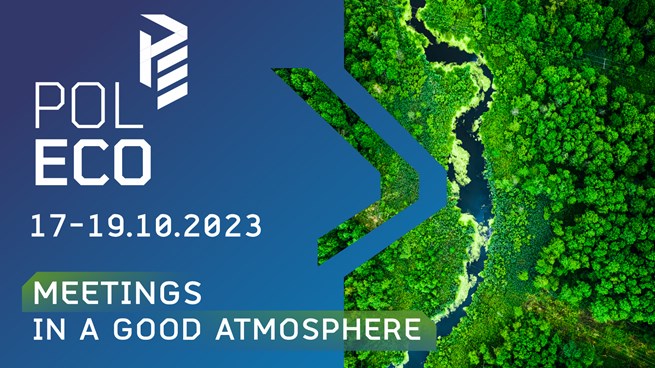POLECO 2022 - three days full of meetings in a good atmosphere are behind us (summary)
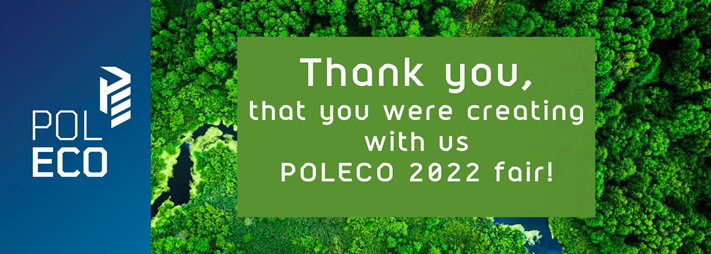
This year's POLECO International Fair of Environmental Protection is coming to an end - Friday, October 21, is the last day of the event, during which over 150 exhibitors from nine countries presented their novelties, received Gold Medals of the MTP Group, and organized, together with the MTP Group, numerous conferences and presentations.
The answer to the needs of the industry
In addition to a rich exhibition of products and services, POLECO is also a wide conference area, combined with industry debates responding to the most pressing topics in the environmental protection industry.
The National Fund for Environmental Protection and Water Management returned to POLECO with the conference - "Stable financing of Poland's eco-development in unstable times". The conference - held on the stage in Aleja Lipowa MTP - was led by the deputy presidents of the National Fund for Environmental Protection and Water Management: Paweł Mirowski, Dominik Bąk and Sławomir Mazurek.
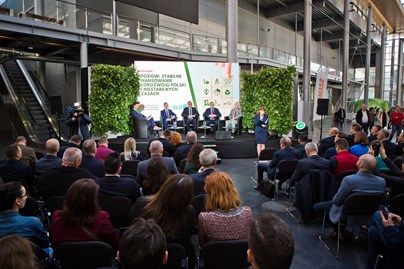
They talked to their guests about clean air and warm housing as a strategic plan for Poland, about the main challenges in the transformation of the Polish energy and heating sector, about climate change and water deficit in Poland, as well as about combustion and fermentation as ways to solve climate problems without draining the pockets of Poles.
Zero-emission transport – an opportunity or a threat?
A novelty during this year's edition of POLECO was the conference "Zero-emission transport and municipal services - economic aspects, directions of development, opportunities and opportunities" organized by the MTP Group. During this event, the latest low-emission solutions in the municipal services sector were discussed.
- As Poland, we can confidently compete on the hydrogen market. If only the regulator did not block solutions for obtaining energy from renewable sources, we would have enough energy to produce green hydrogen - said Paweł Banach from Bank Ochrony Środowiska S.A. during the conference.
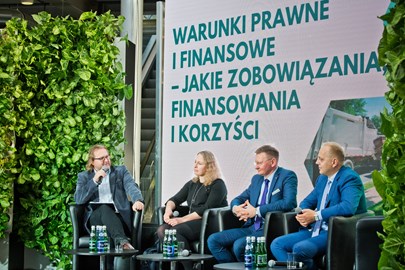
- Zero emission technologies for transport must be cheaper. If we wanted to collect garbage only with electric or hydrogen vehicles, we would have to increase the prices of this service 3 or even 4 times - added Dominik Marczyk from Błysk Łomża - Usług Komunalne.
- We need to completely reprogram our thinking about fuels and energy. There will no longer be a centralized energy economy. In the future, hydrogen will be produced and used locally, predicted Paweł Piotrowicz from TÜV SÜD.
- Electric vehicle charging technologies have accelerated greatly. We will be able to charge the car in a few minutes. We already have technologies that make this possible, argued Tomasz Kloc from Ekoenergetyka-Polska S.A.
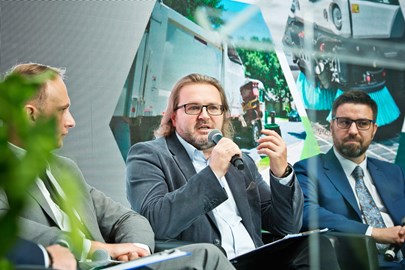
- The best and the safest is healthy diversification - i.e. a situation when a transport company has vehicles using different energy sources in its fleet. Let us remember that there are many ways to decarbonize transport - emphasized Jacek Nowakowski from IVECO Poland Sp. z o. o.
- We do not close ourselves to any direction of development that leads to zero-emission transport. Poland on the map of Europe is no longer such a blank spot in this respect. Electric cars are now able to travel around Poland. Of course, hydrogen also has potential. However, in our country, as in the rest of the world, there is a shortage of green hydrogen. The technology of driving vehicles with this gas has a good chance, but it still needs time - summed up Maciej Gis from the Polish Alternative Fuels Association.
Let's talk about good waste practices
The conference "Good waste management practices - let's talk about..." was jointly organized by TOMRA Systems ASA, Plastics Europe Polska, Waste Management and Recycling Cluster - National Key Cluster and Grupa MTP. For three fair days, experts showed and discussed the best practices in the waste industry.
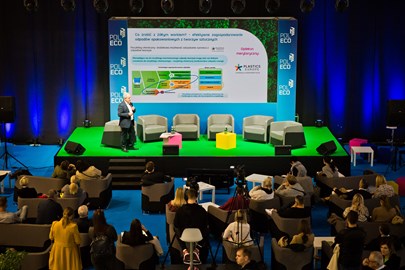
Anna Sapota from Tomra Systems ASA, representing one of the co-organizers of the event, spoke during the conference about holistic waste management as a model of interdependent tools to facilitate the transition to a circular economy. This model was developed by Eunomia experts in cooperation with and commissioned by TOMRA.
They analyzed best practices for collection, sorting and recycling in proven global markets. It includes three basic elements: selective collection (bio-waste, paper, glass, textiles and electrical and electronic equipment, optionally plastic packaging), a deposit-refund system for beverage packaging and sorting mixed municipal waste before incineration or storage.
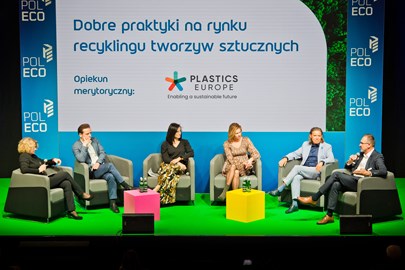
Radosław Domagała from Plastics Europe Polska (also a co-organizer of the conference) in the presentation "Waste data - what do we need?" spoke about the latest information from this market. Plastics Europe, fulfilling the commitments of the plastics industry taken in response to the Strategy for Plastics announced in 2018, provides data on the plastics market, including recycled raw materials present in new products.
The latest data, developed by Plastics Europe, on closing the loop of plastics in the European economy, has been extended to Poland for the first time this year. They indicate, among others, that the share of regranulate in the quantities processed by Polish processors is about 15%, with only 9.3% coming from post-consumer waste. A critical analysis of the available data on the composition of plastic waste produced and managed in Poland will allow for a better understanding of the actual morphology of plastic waste ("sub-fractions"), which in turn is necessary for the development of the plastics recycling sector.
Apart from experts from TOMRA and Plastics Europe Polska, the organizers of the conference were also members of the Waste Management and Recycling Cluster. They talked about good examples in the transformation of enterprises towards a circular economy (CE). As explained by Katarzyna Bachowicz and Agnieszka Zdanowicz from Klaster, it will not be possible without the active participation of innovative enterprises from the SME sector, occupying a stable place in circular value chains. However, to make this possible, it is important to build new and transform existing business models in the enterprise based on the model (transition from a linear to a circular model) and inclusion in new value chains.
Where to start, how to make changes - this was discussed during the session devoted to the transformation of circular economy, also pointing to good examples of this. In parallel with the circular economy transformation, it is invariably important to increase the innovativeness of enterprises also in technological areas that do not have to be directly related to the circular transformation. These processes are obviously also supported by the use of solutions in the area of Industry 4.0, whose main assumption, unlike previous industrial revolutions, is system integration and networking.
Ryszard Piotrowski from Ardagh Glass S.A. spoke about glass recycling as an element of closing the circulation of raw materials. Agnieszka Zdanowicz from the Waste Management and Recycling Cluster talked about "ClusterLab", i.e. transformation towards circular economy and innovations, and Piotr Nejman from the Circular Poland Foundation pointed to the biggest challenges accompanying the title "circulation economy transformation".
Kazimierz Poznański, President of the Chamber of Commerce for Non-Ferrous Metals and Recycling, spoke about how important lead is in our economy. According to experts, no electric car produced today will be fully safe and independent if it is not equipped with a lead battery. Poland is one of the leading producers of primary lead. We also occupy a leading position in Europe both in terms of production and export of lead batteries. Recycling of lead batteries will therefore accompany us for at least 30 more years. Marek Suchowolec from the board of IGMNiR also spoke about it.
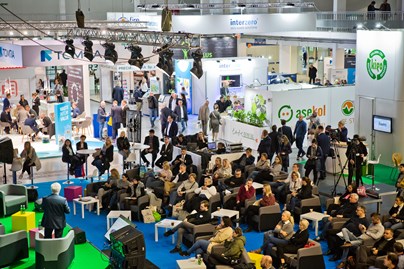
In turn, Jakub Chwalewski from TOMRA Sorting spoke about the recovery and recycling of aluminum. This is an important element of the entire market, including the automotive and transport markets, the construction and packaging sectors. "Green" aluminum, i.e. completely recycled, is an increasingly common good practice.
Michał Szczotka from the Marszów Waste Management Plant was concluding this year's conference "Good practices in waste management". He talked about good practices in the collection and sorting of glass and wood. ZZO Marszów, being a recycler himself, obtained certificates for glass cullet, changing it from waste into a product on which it finally makes money.
During the conference, several expert debates were held, which attracted a large audience. During them, good practices on the plastics recycling market were discussed, as well as the pros and cons of implementing a circular economy in the company.
Responsibly about environmental protection
The Main Waste Management Section of PZITS and the Environmental Protection Section of the Wielkopolska Branch of PZITS organized the 8th Conference "Environmental protection in practice in the light of current legal regulations". The program included such topics as environmental impact assessment for projects related to the operation of waste treatment installations and preventing major accidents, taking into account substances that deplete the ozone layer, fluorinated greenhouse gases and REACH.
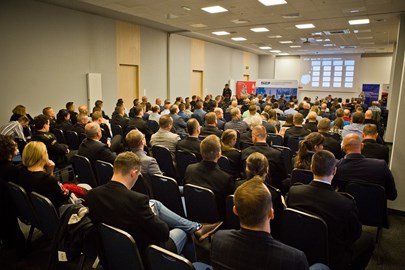
Another conference during this year's POLECO was devoted to the threats to people and the environment in waste management and fire prevention in the production, processing and storage of waste. Issues related to the threats to the environment and humans that occur during waste fires, problems related to fire protection in the waste law, as well as foreign guidelines on fire safety of waste storage and processing sites were discussed during the meeting.
Waste, raw materials, climate, environment, science and culture
The Polish Agency for Enterprise Development and Innovation Norway invited to the event "There is no waste, only raw materials" addressed to entrepreneurs, startups and institutions from the business environment offering innovative solutions and processes related to environmental protection.
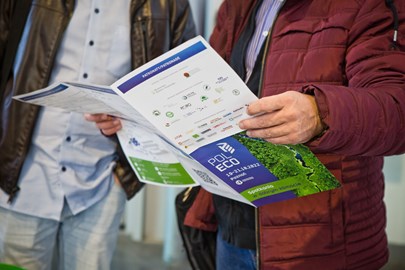
Recovery of energy and waste heat as well as recycling of waste electrical and electronic equipment, as well as the extended producer responsibility system, are the topics discussed during the "Energy and Recycling Forum" organized for the 22nd time by the editors of the "Energia i Recycling" monthly.
Fair participants could also take part in the conferences "Climate and Environment" - a local government initiative devoted to the issues of adaptation to climate change in terms of environmental management, as well as "Nature and Culture", which presented cultural inspirations for pro-ecological attitudes and environmental inspirations for culture .In addition, Nahtec prepared a presentation entitled “Bio-LNG. BioLNG production technology. Contracts for the purchase of bioLNG and CO2 emission reduction certificates”, and the Częstochowa University of Technology a speech by dr hab. Eng. Christina Malinska Mr. "Multilayer biodegradable film for mulching crops".
ICT inspirations - new technologies and sources of financing
The MTP Group and the Wielkopolski ICT Cluster invited to the eighth edition of the intimate meeting "ICT Inspiration - new technologies and sources of financing". During the conference, IT companies from Wielkopolska presented the latest technological trends along with examples of their applications in the field of climate protection, environment, municipal management and sustainable development. Later, as part of individual interviews, participants had the opportunity to assess the usefulness of the technologies they selected in their business.
The 3W idea, i.e. water, hydrogen, carbon
Bank Gospodarstwa Krajowego presented the 3W Idea at its fair stand. 26 business partners and 12 scientific entities gathered around the 3W Interdisciplinary Innovation Center have already joined this initiative. The 3W idea, undertaken by BGK, is a response to the greatest contemporary challenges faced by the world: climate change, energy transformation or access to drinking water. One of the goals of the initiative is to strengthen the competitiveness of Polish enterprises and more effectively use the strategic resources of the future, i.e. water, hydrogen and coal. This project integrates various environments, e.g. scientists, entrepreneurs and representatives of the public sector.
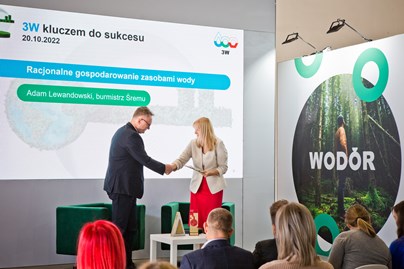
The 3W initiative appreciates the role of scientists in creating the latest technologies, it also tries to improve the process of commercialization of innovative solutions in the field of water, hydrogen and coal. For this reason, the 3W Interdisciplinary Innovation Center was created. The agreement on its establishment was signed with BGK by representatives of 11 universities, including leading technical universities, and a representative of the Łukasiewicz Research Network. The Center helps the scientific community in introducing inventions in the field of water, hydrogen or coal to the market, finds business partners for them, supports in obtaining funds for the development of projects in the 3D sector, provides project piloting and evaluation, as well as legal consultations.
During POLECO, meetings were also held with experts from the Polish Investment Zone Wielkopolska, within which Special Economic Zones intensify their activities in Wielkopolska. The participants of the meetings could learn how to obtain public aid in the amount of up to 45% of the value of eligible investment costs, which means that in such a situation the investor does not pay income tax up to the amount of the granted support, even for 10 or 15 years.
Premieres and news
During POLECO, a lot of new products presented by exhibitors were waiting for visitors. R3 Polska presented, for example, Recomat, a device for collecting, compacting and segregating packaging. ARBENA showed a new tunnel hall with a width of 24 m, which is characterized by a steel structure based on a square truss. Agro Sieć Maszy presented a new range of John Deere compact tractors, including: sweepers, snow plows, sand spreaders, front loaders and separating tillers.
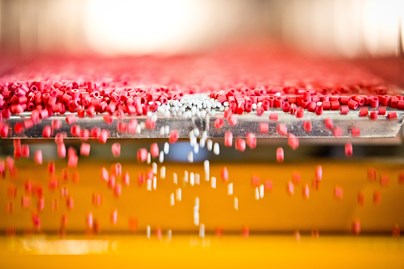
In turn, Garden Spot, which is a manufacturer of Pixel Garden modules used to build vertical gardens, presented an efficient overflow system that ensures effective irrigation of plants primarily in commercial spaces, public facilities, but also in private homes. ARTechnic also presented a novelty at POLECO - it is the Intimus industrial shredder from the SmartShred series.
MTP Group Gold Medals
As every year, the MTP Group Gold Medals were awarded during POLECO for the best products and services. This year's winners of this prestigious award are: Idea 3W of Bank Gospodarstwa Krajowego, BACKHUS A 38 - compost heap turner, ION ART - technology for selective surface water treatment, Comprehensive Photovoltaic System S-F EKO-SOLAR, Globtrak Communal Module, organic agent improving soil properties Ole! comp!, recomat SMART RVM, Matthiessen bale ripper, Glutton self-propelled electric vacuum cleaner, ballistic separator and SiCompact 2020 - compact XL SiDrop module. The Gold Medals of the MTP Group were solemnly awarded during the Industry Evening, which was organized in the oldest facility on the MTP grounds, i.e. in the Trade Fair Spire.
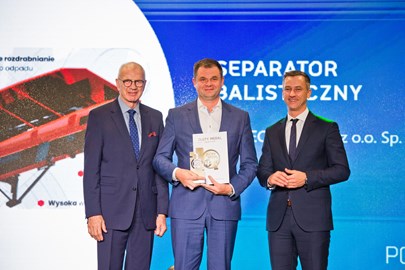
In addition to the Gold Medals, ACANTHUS AUREUS statuettes were also awarded for the best exhibition stands. This distinction is awarded to exhibitors who best understand how modern expo marketing builds the company's image and its business value.
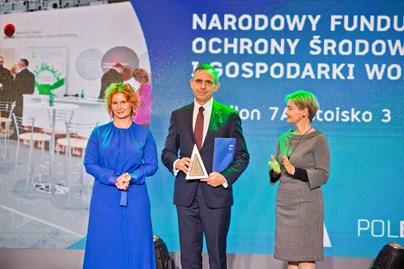
A dozen or so companies also received jubilee diplomas of recognition for their activities during the ceremonial Industry Evening, organized in the spaces of the oldest facility on the MTP grounds, i.e. in Iglica.
